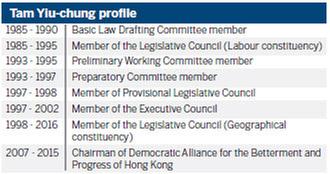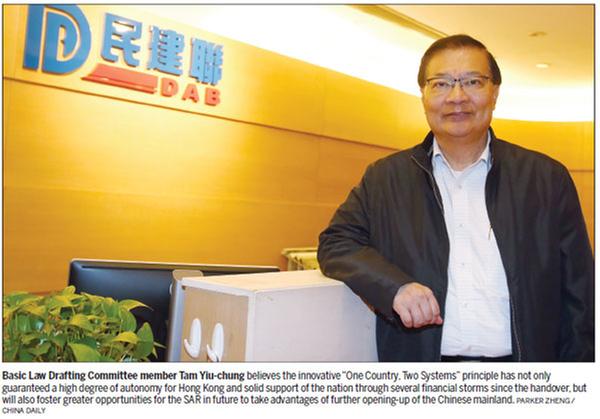'One Country, Two Systems' best for all: Tam

Basic Law co-drafter says'One Country, Two Systems' is a great concept that ensures
a smooth future for Hong Kong; it should be continued after 2047. Joseph Li writes.
As Hong Kong celebrates the 20th anniversary of reunification with the country, Basic Law Drafting Committee member Tam Yiu-chung hails "One Country, Two Systems" as the best arrangement because it benefits both the country and the city.
In his opinion, "One Country, Two Systems" should remain unchanged after 50 years. He dismisses the so-called "2047 question" and second negotiation as "non-issues".

Some problems have occurred through the years but these are inevitable within "Two Systems", he said.
Speaking to China Daily in an exclusive interview, Tam - former chairman of the Democratic Alliance for the Betterment and Progress of Hong Kong - recalled that during the negotiations in 1979 on the future of Hong Kong, Britain "tested" China to see if it had the courage to recover Hong Kong.
"Britain was very tricky. It knew China was busy with economic reform and opening-up and it was not very strong as a country at that time. Britain also proposed to maintain its rule over Hong Kong while letting China resume the sovereignty, but such a proposal was rejected.
"Paramount leader Deng Xiaoping thought it was out of the question. If China failed to resume the exercise of sovereignty over Hong Kong, he could not account to the nation, Chinese people and history. Deng ruled out 'One Country, One System' because he knew Hong Kong people would not accept it. He preferred 'One Country, Two Systems', which he thought would help China's economic reform and development by making use of Hong Kong's strengths."
On May 27, a seminar on the 20th anniversary of Hong Kong's handover was held in Beijing. At the seminar, Zhang Dejiang, chairman of the National People's Congress Standing Committee, said Hong Kong's high degree of autonomy was promised by the central government. In no way will the central government's authority be opposed in the name of a high degree of autonomy.
Tam, who attended the seminar, said: "I told the seminar that without doubt, 'One Country, Two Systems' that promises a high degree of autonomy for Hong Kong people ruling Hong Kong is the best option."
"Over the past two decades, 'One Country, Two Systems' has been on the whole successful. In any system, problems are bound to occur while there are also problems in the United States and United Kingdom," he remarked.
"There are people who do not want 'One Country, Two Systems' to succeed and they even want to seize power from the central authorities," he commented. "Hong Kong enjoys a high degree of autonomy as a special administrative region, yet some people deem Hong Kong as though it were an 'autonomous region' beyond a high degree of autonomy."
He cited several examples of success for "One Country, Two Systems".

"The Hong Kong SAR passport holders enjoy visa-free entry into more than 100 foreign countries. Hong Kong residents can travel freely with the SAR passports but before 1997, people were worried and applied for British National (Overseas) passports," he explained.
All Hong Kong laws, except those contravening the Basic Law, remained valid after 1997, he noted. Setting up of the Court of Final Appeal in Hong Kong was an important milestone.
He said: "Although some people are unhappy that the power to interpret the Basic Law rests in the National People's Congress Standing Committee, the top legislature has only interpreted Basic Law on five occasions in 20 years, showing it has very strong justifications to do so each time and it exercises its power cautiously."
Co-location of immigration, customs and quarantine facilities at Shenzhen Bay Control Point is another classic example of "One Country, Two Systems". The central government authorizes Hong Kong officers to enforce Hong Kong laws on the other side of the boundary, he said.
When asked to name controversies or shocks that Hong Kong encountered after 1997, he said: "Hong Kong was under attack from two financial storms. Each time, it recovered fairly quickly. I think it was largely because we had the solid support of the motherland and this reflected Hong Kong's advantageous position under 'One Country, Two Systems'."
Contact the writer at
joseph@chinadailyhk.com

(HK Edition 06/23/2017 page4)
Today's Top News
- 2025 in review: Resilience amid headwinds
- Economy, ecology flow together in Yangtze Delta
- Xi: Advance rigorous Party self-governance
- Pricing deal to avoid EU tariffs on Chinese EVs
- Anti-corruption efforts focus more on work conduct issues
- Canadian PM to make official visit to China






























